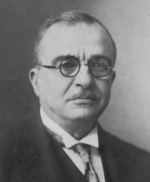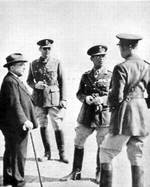Ioannis Metaxas
| Surname | Metaxas |
| Given Name | Ioannis |
| Born | 12 Apr 1871 |
| Died | 29 Jan 1941 |
| Country | Greece |
| Category | Government |
| Gender | Male |
Contributor: C. Peter Chen
ww2dbaseIoannis Metaxas (Ιωάννης Μεταξάς) was born in Ithaca, Greece. He joined the Greek military in the late 1890s and fought in the war against Turkey. In the early 1900s, he studied in Germany. Returning to Greece, he fought in the Balkan Wars between 1912 and 1913. He reached the rank of captain in 1913 and served as the chief of the General Staff despite the junior rank; in this role, he participated in the modernization of the Greek Army. In 1916, he was promoted to the rank of lieutenant general. In Jun 1917, Eleftherios Venizelos overthrew the Greek monarch King Constantine I. Metaxas followed the king into exile to the French island of Corsica. He retired from the army in 1921. In 1920, Venizelos was defeated in an election, which prompted Metaxas to return. In 1922, Constantine was forced into exile again, but this time, Metaxas remained, now serving as a politician, founding the Freethinkers' Party on 12 Oct 1922. In Oct 1923, he was implicated with the failed Leonardopoulos-Gargalidis coup, which led to him fleeing the country until 1924. In 1926, the Freethinkers' Party claimed 15.78% of the popular vote and gained 52 seats in the Greek Parliament; with his party gaining influence, he was appointed the Communications Minister under Prime Minister Alexandros Zaimis. Between 1928 and 1933, his party steadily lost ground in elections, but he remained influential, serving as Interior Minister under Prime Minister Panagis Tsaldaris. In 1935, Greece became a monarchy again, and King George II appointed Minister of War Metaxas to the position of Prime Minister in the following year. In this position, faced with widespread unrest, he declared a state of emergency and assumed dictatorial powers. He suspended the parliament and certain articles of the constitution and outlawed political opposition. On 4 Aug 1936, he declared the 4th of August Regime and took on the title of Arkhigos, or "leader". Patterning his regime after Benito Mussolini's fascist regime, he instituted policies that favored the working class in order to improve the nation's productivity while also securing his power base; he was also credited with founding the first social security program in Greece. Although ruling from the right, his social policies kept the political left content. In terms of foreign policy, he was pro-British, but argued for neutrality largely because Germany was a major trading partner of Greece. On 28 Aug 1940, at the face of Italian threats, he was quoted in saying that "I place the dignity of Greece above everything else. I will not yield to the Italians". Two months later, on 28 Oct 1940, Italy gave Greece an ultimatum and three hours to respond. Metaxas refused to give in to Italian demands for territory, responding "Alors, c'est la guerre" ("Then it is war"); with Italian troops crossing into the Greco-Albanian border a few hours later, Greece entered into the European War. Under his direction, Greece forces held against the Italian invasion, and then counterattacked and pushed into Albanian territory. Metaxas died of toxaemia in Athens, Greece amidst the Greco-Italian War; some speculated foul play in his death.
ww2dbaseSource: Wikipedia
Last Major Revision: Jun 2006
Photographs
 |  |
Ioannis Metaxas Timeline
| 12 Apr 1871 | Ioannis Metaxas was born in Ithaca, Greece. |
| 12 Oct 1922 | Ioannis Metaxas found the Freethinkers' Party in Greece. |
| 13 Apr 1936 | Ioannis Metaxas was appointed the Prime Minister of Greece. |
| 4 Aug 1936 | General Ioannis Metaxas, the Greek Royalist Dictator, declared the 4th of August Regime; he took on the title of Arkhigos. With the authority of the recently restored King George II, he issued a decree putting an end to party politics. His rule was enforced by the police and secret police of his loyal supporter, Constantinos Maniadakis, Minister of National Security. |
| 28 Oct 1940 | Greek leader Ioannis Metaxas rejected the Italian ultimatum; realizing the Italians were already preparing for an invasion, he noted "Alors, c'est la guerre" ("Then, it's war"). 85,000 Italian troops crossed the border from Albania, outnumbering the 30,000-strong Greek Army. |
| 29 Jan 1941 | Ioannis Metaxas died of toxaemia in Athens, Greece. |
Please consider supporting us on Patreon. Even $1 per month will go a long way! Thank you. Please help us spread the word: Stay updated with WW2DB: |
Visitor Submitted Comments
2 Jun 2019 07:11:56 PM
What if metaxas followed Venizelos instead of an arrogant king? Maybe the "great idea" would have survive and the Asia Minor Catastrophy avoide!
All visitor submitted comments are opinions of those making the submissions and do not reflect views of WW2DB.

» Balkans Campaign
- » 1,182 biographies
- » 337 events
- » 45,132 timeline entries
- » 1,249 ships
- » 350 aircraft models
- » 207 vehicle models
- » 376 weapon models
- » 123 historical documents
- » 261 facilities
- » 470 book reviews
- » 28,431 photos
- » 365 maps
James Forrestal, Secretary of the Navy, 23 Feb 1945
14 Oct 2010 05:12:44 AM
Dear Mr. Chen,
Congratulation for your site on WWII, but there is an absence. Greece, being with the Allies, is not mentioned under the topic COUNTRIES.
I am Ioannis Metaxas grand daughter, and I agree with your text about him, although there are more to be said about his carrier in the Greek army 1886-1916, when as a member of General Staff at the A’ Balkan War 1912-1913 became Executive Chief of General Staff at the B’ Balkan war in 1913, although he was still a captain. He became colonel after that. He was named General when he retired in 1921.
As a Statesman 1922-1936, he was elected many times as member of Parliament and Minister, before his election by Parliament as Prime Minister of Greece 1936. If you are interested you may visit our official site in Greek. Unfortunately there are still few references in English.
http://ioannismetaxas.gr
Greece before the 28th of October had a policy of neutrality because Metaxas knew that the Italians had a long history of aggression toward Greece. There was also the occupation of the Greek populated Dodecanese since 1912 by the Italians. Metaxas strictly maintained neutrality, on the other hand he had declared since spring of 1939, that Greece would fight by the side of the Allies, in the case of invasion, and prepared the army as well as the whole nation for that case. The dictatorial regime of 4th of August was the way to save time toward these goals. Fighting by the side of the Allies was also a guarantee that the Dodecanese would return to Greece after the War, as we can see in his discussions with Greek and British officers, the Ambassador of Great Britain and Churchill himself. Dodecanese was united with Greece in 1948.
Winston Churchill
“Until now we used to say that the Greeks fight like heroes. Now we shall say: The heroes fight like Greeks”.
(From a speech he delivered from the BBC in the first days of the Greco Italian war).
Adolf Hitler
“For the sake of historical truth I must verify that only the Greeks, of all the adversaries who confronted us, fought with bold courage and highest disregard of death”.
(From speech he delivered to Reichstag on May 1941)
Best regards
Ioanna Phoca - Metaxa
.